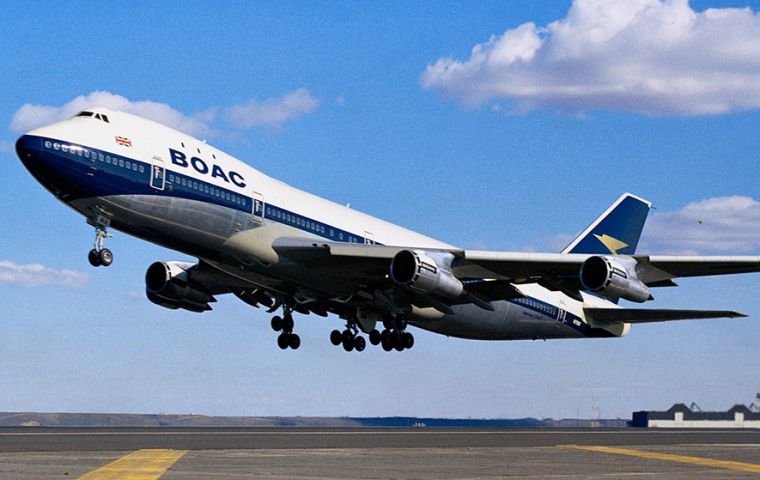MercoPress. South Atlantic News Agency
British Airways going back to the future for its 100 years
 British_Airways is celebrating its 100th birthday with a retro 747 livery. The 1964-1974 BOAC paint will be worn by G-BYGC until retirement in 2023
British_Airways is celebrating its 100th birthday with a retro 747 livery. The 1964-1974 BOAC paint will be worn by G-BYGC until retirement in 2023 British Airways going back to the future and painting four of its aircraft in colors schemes from its past as part of its 100-year birthday this year. First aircraft, a BOAC-liveried Boeing 747, reg: G-BYGC, will arrive back at Heathrow from the paint factory on February 18 to enter the airline’s flying schedule.
Three more aircraft will receive popular designs from British Airways’ past over the coming months with more details to be revealed in due course.
All four aircraft will fly British Airways’ routes, showcasing some of the popular designs as part of the airline’s centenary celebrations.
Alex Cruz, British Airways’ Chairman and CEO, said: “So many British Airways customers and colleagues have fond memories of our previous liveries, regularly sharing their photos from across the globe. It’s incredibly exciting to be re-introducing some classic designs, and what better place to start than the iconic BOAC livery.
“Our history has shaped who we are today, so our centenary is the perfect moment to revisit our heritage and the UK’s aviation landscape through these iconic designs. We’re excited to share details of the other liveries over the coming weeks.”
The 747 has been deliberately chosen for the BOAC livery as it is a later variant of the same aircraft type that adorned the design when it was initially in operation.
The BOAC livery will remain on the Boeing 747 until it retires in 2023. By this time, British Airways will have retired the majority of its 747 fleet, replacing them with new state-of-the-art long-haul aircraft.
This includes taking delivery of 18 A350s and 12 Boeing 787 Dreamliners in the next four years – which feature new cabins and are more environmentally efficient – as well as another 26 short-haul aircraft, all part of the airline’s £6.5bn investment for customers.
A livery that may be used is that of BEA, which was merged with BOAC to form British Airways. Here 6 BEA Tridents await delivery at Hatfield in the 1960s. Credit BAE Systems
Brief BA history:
On August 25, 1919, British Airways’ forerunner company, Aircraft Transport and Travel Limited (AT&T), launched the world’s first daily international scheduled air service between London and Paris.
In 1924, Britain’s four main fledgling airlines, which had by then evolved into Instone, Handley Page, Daimler Airways (a successor to AT&T), and British Air Marine Navigation Company Limited, merged to form Imperial Airways Limited.
By 1925, Imperial Airways was providing services to Paris, Brussels, Basle, Cologne and Zurich. Meanwhile, a number of smaller UK air transport companies had started flights and in 1935, they merged to form the original privately-owned British Airways Limited, which became Imperial Airways’ principal UK competitor on European routes.
Following a Government review, Imperial Airways and British Airways were nationalized in 1939 to form British Overseas Airways Corporation (BOAC). Continental European and domestic flights were flown by a new airline, British European Airways (BEA) from 1946. BOAC introduced services to New York in 1946, Japan in 1948, Chicago in 1954 and the west coast of the United States in 1957. BEA developed a domestic network to various points in the United Kingdom, including Belfast, Edinburgh, Glasgow and Manchester.
From 1946 until 1960, BOAC and BEA were the principal British operators of scheduled international passenger and cargo services – and they preserved Britain’s pioneering role in the industry. The 1950s saw the world enter the passenger jet era – led by BOAC, with the Comet flying to Johannesburg in 1952, halving the previous flight time.
Additional airlines began to pass into BEA’s ownership and in 1967, the Government recommended a holding board be responsible for BOAC and BEA, with the establishment of a second force airline, resulting in British Caledonian being born in 1970.
Two years later, the businesses of BOAC and BEA were combined under the newly formed British Airways Board, with the separate airlines coming together as British Airways in 1974.
In July 1979, the Government announced its intention to sell shares in British Airways and in February 1987 British Airways was privatized.
By G. Thomas-AirlineRating




Top Comments
Disclaimer & comment rulesCommenting for this story is now closed.
If you have a Facebook account, become a fan and comment on our Facebook Page!